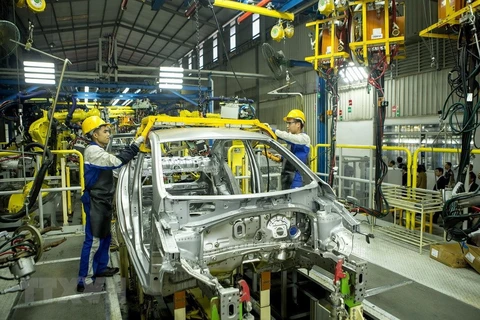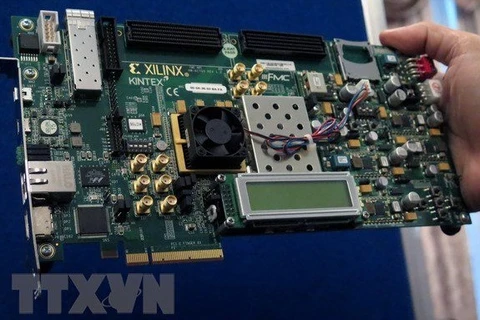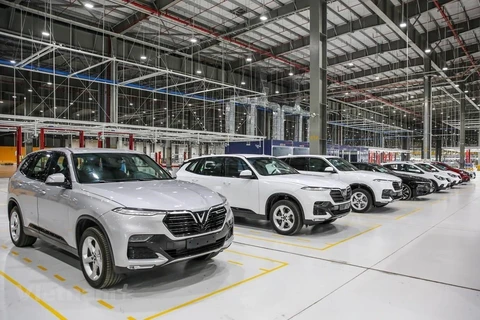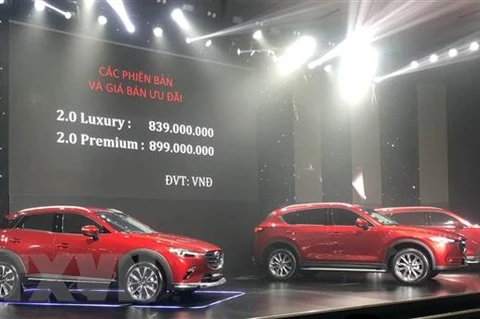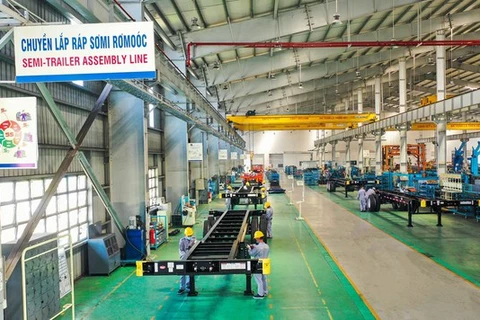Hanoi (VNA) – Vietnam has continually recorded unprecedented declines in car sales due to impacts of social distancing and the shortage of components.
The Vietnam Automobile Manufacturers’ Association (VAMA) reported that 8,884 vehicles were sold in August, dropping 45 percent from July and 57 percent from the same period last year. They include 6,231 passenger cars, down 40 percent; 2,344 commercial vehicles, down 55 percent; and 309 special-purpose vehicles, down 33 percent month on month.
Of the sold units, 5,345 were domestically assembled cars while the remaining 3,539 were imported, both down 41 percent from the previous month.
VAMA said this was the record low in car sales in Vietnam since 2015. The second lowest was recorded in February 2016, which coincided with the Lunar New Year holiday, when only 11,718 vehicles were sold.
In the first eight months of 2021, VAMA members sold 175,400 units, rising 15 percent year on year. Compared to the pre-pandemic period, the sales fell 13 percent, with domestically assembly cars down 17 percent and imported ones down 8 percent.
However, the abovementioned sales yet to fully reflect the entire auto market of Vietnam since such brands as Audi, Jaguar Land Rover, Mercedes-Benz, Subaru, Volkswagen, and Volvo did not reveal their sales.
Among those that are not VAMA members, VinFast sold 2,310 automobiles in August, adding up to 22,030 units sold in the first eight months of this year. TC Motor delivered 2,182 vehicles to customers last month, plunging 46 percent from July and resulting in 40,248 units sold in eight months.
According to reports from VAMA, TC Motor, and VinFast, the entire market saw 13,376 vehicles sold in August.
The Vietnamese car brand VinFast topped the list of sellers with 2,310 units sold. It was followed by Toyota (2,257), Hyundai of TC Motor (2,182), Kia (1,538), Mazda (868), and Honda (567).
Of the top 10 best-sellers, VinFast Fadil posted sales of 2,048 units, sustaining its leading position in the market. The others were Toyota Vios (987), Kia Seltos (832), Toyota Corolla Cross (759), Hyundai Accent (712) , Ford Ranger (396), Hyundai Grand i10 (394), Kia Cerato (393), Hyundai SantaFe (390), and Mazda CX-5 (332).
Insiders attributed the record downturn to August’s coincidence with the seventh lunar month, which is traditionally called the “ghost month”, prolonged social distancing in many localities, and the global shortage of components and semi-conductor chips, all of which considerably impacted the auto market in Vietnam.
VAMA estimated that more than 200 car agents of its members remain closed and unable to reopen. Besides, more than 200 service garages have also yet to resume operations.
The association said supply chains and distribution activities have become stagnant and been hit hard, adding that many companies have recorded declines of even more than 60 percent in sales.
Experts forecast the auto market in Vietnam could recover slightly next month as many countries are bringing COVID-19 under control and many gradually reopen, but car sales may still fall short of expectations.
According to the Ministry of Industry and Trade, the Vietnamese auto market was one-third of the size of Thailand's and one quarter of Indonesia's.
The ministry pointed out in a report that limited market capacity and price differences between domestically produced and imported cars are the two biggest bottlenecks for the local auto industry. Besides, the auto industry is scattered with many different assemblers and models. This has made it difficult for firms which manufacture, assemble, and produce components and spare parts to invest and develop in means of mass production./.
The Vietnam Automobile Manufacturers’ Association (VAMA) reported that 8,884 vehicles were sold in August, dropping 45 percent from July and 57 percent from the same period last year. They include 6,231 passenger cars, down 40 percent; 2,344 commercial vehicles, down 55 percent; and 309 special-purpose vehicles, down 33 percent month on month.
Of the sold units, 5,345 were domestically assembled cars while the remaining 3,539 were imported, both down 41 percent from the previous month.
VAMA said this was the record low in car sales in Vietnam since 2015. The second lowest was recorded in February 2016, which coincided with the Lunar New Year holiday, when only 11,718 vehicles were sold.
In the first eight months of 2021, VAMA members sold 175,400 units, rising 15 percent year on year. Compared to the pre-pandemic period, the sales fell 13 percent, with domestically assembly cars down 17 percent and imported ones down 8 percent.
However, the abovementioned sales yet to fully reflect the entire auto market of Vietnam since such brands as Audi, Jaguar Land Rover, Mercedes-Benz, Subaru, Volkswagen, and Volvo did not reveal their sales.
Among those that are not VAMA members, VinFast sold 2,310 automobiles in August, adding up to 22,030 units sold in the first eight months of this year. TC Motor delivered 2,182 vehicles to customers last month, plunging 46 percent from July and resulting in 40,248 units sold in eight months.
According to reports from VAMA, TC Motor, and VinFast, the entire market saw 13,376 vehicles sold in August.
The Vietnamese car brand VinFast topped the list of sellers with 2,310 units sold. It was followed by Toyota (2,257), Hyundai of TC Motor (2,182), Kia (1,538), Mazda (868), and Honda (567).
Of the top 10 best-sellers, VinFast Fadil posted sales of 2,048 units, sustaining its leading position in the market. The others were Toyota Vios (987), Kia Seltos (832), Toyota Corolla Cross (759), Hyundai Accent (712) , Ford Ranger (396), Hyundai Grand i10 (394), Kia Cerato (393), Hyundai SantaFe (390), and Mazda CX-5 (332).
Insiders attributed the record downturn to August’s coincidence with the seventh lunar month, which is traditionally called the “ghost month”, prolonged social distancing in many localities, and the global shortage of components and semi-conductor chips, all of which considerably impacted the auto market in Vietnam.
VAMA estimated that more than 200 car agents of its members remain closed and unable to reopen. Besides, more than 200 service garages have also yet to resume operations.
The association said supply chains and distribution activities have become stagnant and been hit hard, adding that many companies have recorded declines of even more than 60 percent in sales.
Experts forecast the auto market in Vietnam could recover slightly next month as many countries are bringing COVID-19 under control and many gradually reopen, but car sales may still fall short of expectations.
According to the Ministry of Industry and Trade, the Vietnamese auto market was one-third of the size of Thailand's and one quarter of Indonesia's.
The ministry pointed out in a report that limited market capacity and price differences between domestically produced and imported cars are the two biggest bottlenecks for the local auto industry. Besides, the auto industry is scattered with many different assemblers and models. This has made it difficult for firms which manufacture, assemble, and produce components and spare parts to invest and develop in means of mass production./.
VNA


